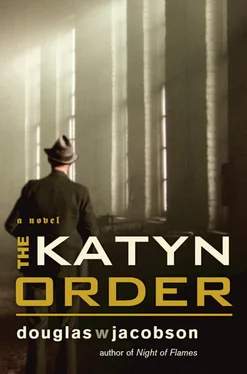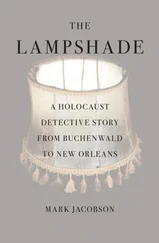“Marshal Zhukov ordered us to leave it standing. He thought the officers might need a place to dine. Fortunately this section of the hotel was spared the worst of the fire.” Kovalenko snapped his fingers, and a waiter appeared with another carafe of wine. “I’m told the SS was dining in this very room, celebrating their Fuhrer’s birthday as we were advancing on the city. Do you like the wine? The cellar was well-stocked when we arrived. Apparently the SS left in a hurry.”
“It’s nice,” Adam replied. “What is it?”
“The Germans call it Trollinger. Too sweet for me,” the general said. “But we can’t have everything.”
The trivial conversation continued until the food arrived. Adam tried the soup first. It was thick with onion but lacked cheese or seasoning. The sauerbraten was tough and the potatoes overcooked, but the heavy brown gravy was all he could taste anyway. He would be glad to get away from German cooking. Across the table, Kovalenko appeared to feel the same.
When they finished, the waiter cleared the table and reappeared a moment later with two snifters of cognac. Kovalenko lifted the glass to his nose and inhaled, gently swirling the amber liquor. “Rémy Martin, one of the few things the French ever got right,” he said. “The SS were kind enough to leave several hundred cases in the cellar as well.” He fixed Adam with a sharp look over the rim of the glass. “Did you serve in the Polish Army, Mr. Nowak?”
The curious question caught him off guard. Was it possible that Kovalenko did not remember him from their meeting that night across the river from Warsaw? Adam doubted that and took a sip of cognac before answering. “I’m an American, General Kovalenko. I served in the American Army from 1933 to 1936.”
“But you were living in Krakow when the war broke out.”
As Whitehall had predicted, the Russians had investigated his background. “I was living there as a civilian, following my discharge from the army. I studied law at Jagiellonian University. I had family in Krakow. But you probably know that.”
“The Germans deported you in ’39?”
“Yes.”
“So, you returned to America?”
“No, I went to London,” Adam replied. The well-rehearsed story rolled out more easily than he’d expected. “I worked as liaison between the British and the Polish Government-in-Exile. I was born in Poland, you see, so my fluency in the language is—”
Kovalenko abruptly lit a cigarette and blew out a mighty cloud of smoke. He leaned forward, glancing around the dining room. “A word of caution, Mr. Nowak. Major Tarnov has taken an interest in you.”
Adam’s spine tingled. “And why would Major Tarnov be interested in me?”
Kovalenko waved a hand dismissively. “Ah, he’s NKVD. They’re all paranoid. You weren’t associated with those AK anarchists in Poland, were you?”
Adam maintained eye contact with Kovalenko. This is a very clever—and very dangerous—adversary. “No, General, I wasn’t.”
The general’s expression was inscrutable as he flicked cigarette ashes into the sterling silver ashtray. Then his eyes moved toward the front of the dining room. “Ah, our drivers have arrived.”
Two Red Army officers stood at the entrance. General Kovalenko led the way across the room. He motioned toward the officer with the eye patch who had driven Adam to the hotel. “Captain Andreyev will drop you back at the Kommandatura. He will meet you there again at 0700 tomorrow and drive you to Sachsenhausen. Perhaps you will find what you’re looking for.”
23 MAY
THE ROADWAY leading into the Sachsenhausen concentration camp passed through the center of a stately three-story brick building. Captain Andreyev stopped the GAZ-11 in front of the gate and exchanged a few words with the Red Army soldiers standing guard. Adam grimaced as he read the sign in the center of the gate: Arbeit Macht Frei. Yes, “work will set you free”… until they send you to the gas chamber.
The gate opened, and Captain Andreyev gunned the engine. They drove through and stopped on the other side in a vast semicircular courtyard surrounded by concrete and stucco barracks that radiated outward like the spokes of a giant wheel. Standing prominently at the far end of the bloodstained cobblestone yard was a wooden gallows that Adam guessed was large enough for a half-dozen people.
A moment later the car door opened, and a burly Red Army officer with a thick, black mustache climbed into the backseat next to Adam. Captain Andreyev turned around and said in English, “This is Major Vygotsky. He is in charge of the camp detail. I will interpret for him.”
Major Vygotsky chattered in Russian, and Andreyev repeated in English, as they drove through the immense facility. Adam forced himself to concentrate on what was being said and tried to keep his mind off his precarious situation—an American, formerly a saboteur and an assassin for the Polish AK, touring a German concentration camp with two Russian officers. He felt relieved every time Vygotsky wanted them to have a closer look at something and he could leave the confinement of the auto.
The Russian seemed eager to display his knowledge of the gruesome camp. As they stood inside one of the empty barracks, lined on each side with three-tier wooden racks still reeking of mold and human excrement, Vygotsky stated matter-of-factly, “There were more than sixty-five thousand prisoners in Sachsenhausen as late as January 1945, including ten thousand women. About half of them were marched out by the SS before we liberated the camp. Most of those left behind were too weak to march, and the SS finished them off in the ‘pit’ with machine guns.”
It sickened Adam to think that his uncle had been here. “I heard you found several thousand survivors,” he managed to say.
Andreyev translated, and Vygotsky nodded. “Most of them died within a week. All the rest were taken to hospitals in nearby towns.” While Andreyev’s facial expression remained inscrutable, his shoulders twitched occasionally. Adam noticed a tightness in his voice as he related Vygotsky’s remarks, as though he were disturbed by what he was hearing.
“Do you have their names?” Adam asked.
Upon hearing the translation, Vygotsky roared with laughter. “Names? Yes, we have names—tens of thousands of names, addresses, identification numbers—books full of names. You will see.” They got back in the auto and sped off.
They drove on through the deserted facility with Vygotsky explaining the details and Andreyev continuing to translate. They passed factory buildings where slave laborers had worked to death producing bricks, army boots and munitions, past the medical facility where SS doctors conducted medical experiments on prisoners too weak for work, finally arriving at the “pit.” Andreyev pulled over and stopped the car next to a concrete trench as long as a football field and about half as wide. The flat bottom and slanted sides were covered in blackish-red stains. “The survivors told us the SS only used this for quick and dirty executions,” Vygotsky said, “like right at the end. Most of their work was done at Station Z.”
Adam looked at the grisly killing field. Quick and dirty, like right at the end. Had his uncle been among them?
After a moment they set off again, and Andreyev drove to a large, windowless, concrete-block structure. He circled around to the back and stopped. A neat row of pressure cylinders were chained to the side of the building, each one bearing a prominent red-and-white placard emblazoned with a skull and crossbones.
“This is Station Z,” Vygotsky said. “The SS gassed more than a hundred thousand prisoners here.” He jerked his thumb toward the cylinders. “Zyklon-B, it’s a pesticide, the same thing they used at Auschwitz—very effective. Care to have a closer look?”
Читать дальше












